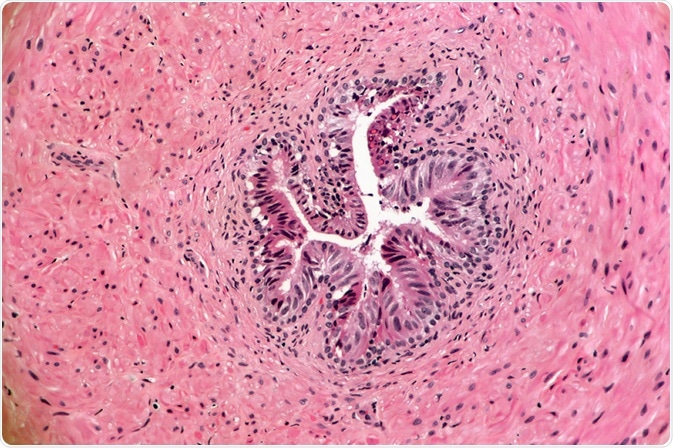It is possible to reverse a vasectomy through a procedure known as a vasovasostomy or a vasoepididymostomy. A vasectomy does have a 100% success rate; therefore, men opting for the procedure should consider it permanent, as reversal can be both difficult and costly.
Surgical Procedure
Vasectomy reversal is usually carried out with general or regional anesthesia, although a local anesthetic may be used in some cases, with or without sedation. The surgery takes between one and four hours, depending on the specific circumstances of the procedure.
The surgical procedure involves two small incisions on either side of the upper scrotum to expose the vas deferens. Both ends are then sliced in half, and the abdominal end is examined and subjected to a saline vasogram to ensure there are no blockages present.

High power cross-section of vas deferens with muscular wall and complete lumen lined by ciliated epithelium. Image Credit: Lisa Culton / Shutterstock
There are two main types of surgery: vasovasostomy and vasoepididymostomy. The choice of which procedure is recommended depends on the vasal fluid and sperm motility's appearance and consistency. Vasovasostomy is the most common and involves the connection of the vas deferens to the other end of the vas deferens. In contrast, a vasoepididymostomy involves the connection of vas deferens to the epididymis.
Vasovasostomy - Mayo Clinic
Patency Success Rate
One of the two main measures of vasectomy reversal success is the patency rate, which refers to the return of motile sperm to the semen when a man ejaculates.
A study from 2007 reported that the vast majority of men (95%) with a vasovasostomy had moving sperm in ejaculate within a year of surgery, and 80% within the short time frame of 3 months. Interestingly, the patient's age at the time of reversal did not seem to affect the results.
Men with a vasoepididymostomy are associated with lower success rates. However, fewer men achieving motile sperm counts, and the time for sperm to return is usually longer.
Pregnancy Success Rate
The pregnancy success rate encompasses the end-goal of a vasectomy reversal and is regarded as the applicable measure of success. However, it is important to recognize that pregnancy success does not depend only on a successful reversal procedure but also on the female partner's factors, such as age.
The rates of pregnancy success following vasectomy reversal vary greatly in scientific studies. However, the average success rate is approximately 55% when the procedure is performed within ten years of the vasectomy, dropping to 25% if performed after this time.
Reversal Failure
The success rate for vasectomy reversal is approximately half of all men who opt to have the procedure, suggesting failure is not an uncommon result. There are several possible reasons for this, including:
- Infertility factors of the female partner, particularly age.
- Development of anti-sperm antibodies in men that impair infertility.
- Development of scar tissue at the reconnection site of the vas deferens, blocking the passage of sperm.
- The occurrence of an epididymal blowout, requiring vasoepididymostomy surgery.
- Elevated pressure of the epididymis with an extended blockage, causing poor sperm motility.
Depending on the reason for failure, it may still be possible for the man to conceive a child. In some cases, medications can be used to alter particular characteristics such as inflammation of the vas deferens, although a second reversal procedure may be required in other circumstances.
In vitro fertilization (IVF) is an alternative method that may help the couple conceive a child. This involves the fertilization of the female egg by the sperm in a controlled scientific situation, which can then be implanted into the female's uterus. This is a good option for many couples, although it does not guarantee success.
References
Further Reading
Last Updated: Mar 1, 2021